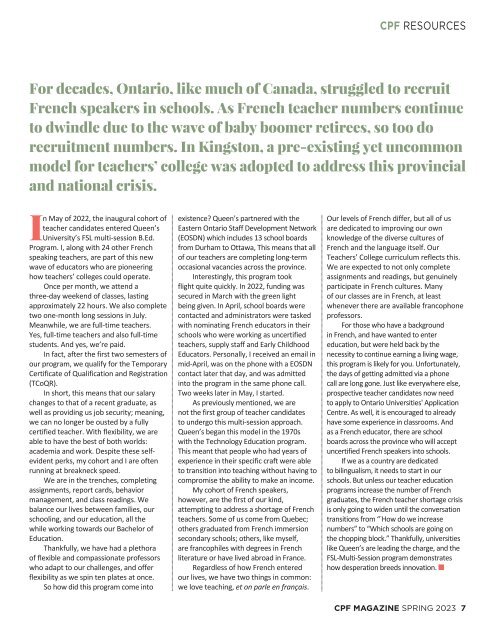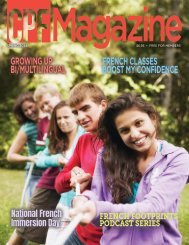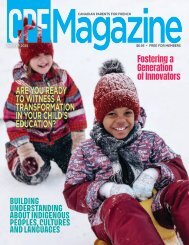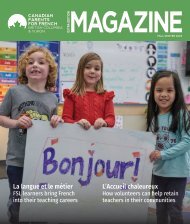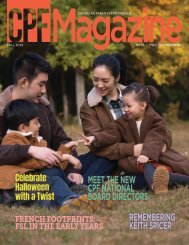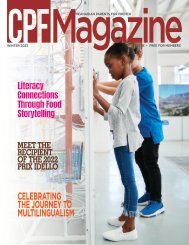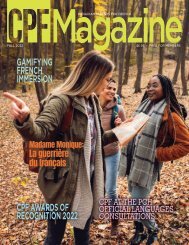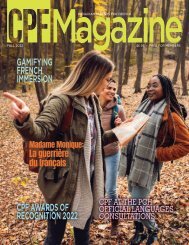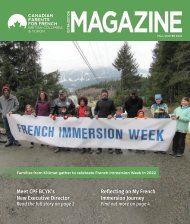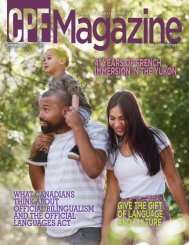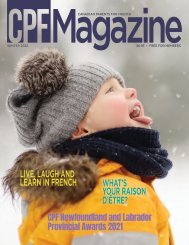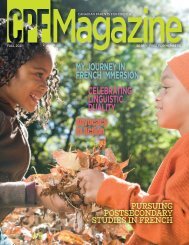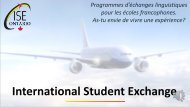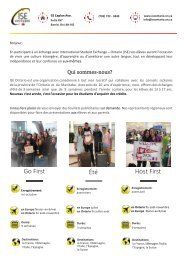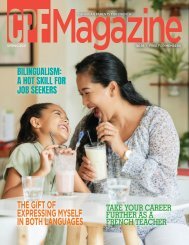CPF Magazine Spring 2023 Issue
A national network of volunteers, parents and stakeholders who value French as an integral part of Canada. CPF Magazine is dedicated to the promotion and creation of French-second-language learning opportunities for young Canadians.
A national network of volunteers, parents and stakeholders who value French as an integral part of Canada. CPF Magazine is dedicated to the promotion and creation of French-second-language learning opportunities for young Canadians.
- No tags were found...
You also want an ePaper? Increase the reach of your titles
YUMPU automatically turns print PDFs into web optimized ePapers that Google loves.
<strong>CPF</strong> RESOURCES<br />
For decades, Ontario, like much of Canada, struggled to recruit<br />
French speakers in schools. As French teacher numbers continue<br />
to dwindle due to the wave of baby boomer retirees, so too do<br />
recruitment numbers. In Kingston, a pre-existing yet uncommon<br />
model for teachers’ college was adopted to address this provincial<br />
and national crisis.<br />
In May of 2022, the inaugural cohort of<br />
teacher candidates entered Queen’s<br />
University’s FSL multi-session B.Ed.<br />
Program. I, along with 24 other French<br />
speaking teachers, are part of this new<br />
wave of educators who are pioneering<br />
how teachers’ colleges could operate.<br />
Once per month, we attend a<br />
three-day weekend of classes, lasting<br />
approximately 22 hours. We also complete<br />
two one-month long sessions in July.<br />
Meanwhile, we are full-time teachers.<br />
Yes, full-time teachers and also full-time<br />
students. And yes, we’re paid.<br />
In fact, after the first two semesters of<br />
our program, we qualify for the Temporary<br />
Certificate of Qualification and Registration<br />
(TCoQR).<br />
In short, this means that our salary<br />
changes to that of a recent graduate, as<br />
well as providing us job security; meaning,<br />
we can no longer be ousted by a fully<br />
certified teacher. With flexibility, we are<br />
able to have the best of both worlds:<br />
academia and work. Despite these selfevident<br />
perks, my cohort and I are often<br />
running at breakneck speed.<br />
We are in the trenches, completing<br />
assignments, report cards, behavior<br />
management, and class readings. We<br />
balance our lives between families, our<br />
schooling, and our education, all the<br />
while working towards our Bachelor of<br />
Education.<br />
Thankfully, we have had a plethora<br />
of flexible and compassionate professors<br />
who adapt to our challenges, and offer<br />
flexibility as we spin ten plates at once.<br />
So how did this program come into<br />
existence? Queen’s partnered with the<br />
Eastern Ontario Staff Development Network<br />
(EOSDN) which includes 13 school boards<br />
from Durham to Ottawa, This means that all<br />
of our teachers are completing long-term<br />
occasional vacancies across the province.<br />
Interestingly, this program took<br />
flight quite quickly. In 2022, funding was<br />
secured in March with the green light<br />
being given. In April, school boards were<br />
contacted and administrators were tasked<br />
with nominating French educators in their<br />
schools who were working as uncertified<br />
teachers, supply staff and Early Childhood<br />
Educators. Personally, I received an email in<br />
mid-April, was on the phone with a EOSDN<br />
contact later that day, and was admitted<br />
into the program in the same phone call.<br />
Two weeks later in May, I started.<br />
As previously mentioned, we are<br />
not the first group of teacher candidates<br />
to undergo this multi-session approach.<br />
Queen’s began this model in the 1970s<br />
with the Technology Education program.<br />
This meant that people who had years of<br />
experience in their specific craft were able<br />
to transition into teaching without having to<br />
compromise the ability to make an income.<br />
My cohort of French speakers,<br />
however, are the first of our kind,<br />
attempting to address a shortage of French<br />
teachers. Some of us come from Quebec;<br />
others graduated from French immersion<br />
secondary schools; others, like myself,<br />
are francophiles with degrees in French<br />
literature or have lived abroad in France.<br />
Regardless of how French entered<br />
our lives, we have two things in common:<br />
we love teaching, et on parle en français.<br />
Our levels of French differ, but all of us<br />
are dedicated to improving our own<br />
knowledge of the diverse cultures of<br />
French and the language itself. Our<br />
Teachers’ College curriculum reflects this.<br />
We are expected to not only complete<br />
assignments and readings, but genuinely<br />
participate in French cultures. Many<br />
of our classes are in French, at least<br />
whenever there are available francophone<br />
professors.<br />
For those who have a background<br />
in French, and have wanted to enter<br />
education, but were held back by the<br />
necessity to continue earning a living wage,<br />
this program is likely for you. Unfortunately,<br />
the days of getting admitted via a phone<br />
call are long gone. Just like everywhere else,<br />
prospective teacher candidates now need<br />
to apply to Ontario Universities' Application<br />
Centre. As well, it is encouraged to already<br />
have some experience in classrooms. And<br />
as a French educator, there are school<br />
boards across the province who will accept<br />
uncertified French speakers into schools.<br />
If we as a country are dedicated<br />
to bilingualism, it needs to start in our<br />
schools. But unless our teacher education<br />
programs increase the number of French<br />
graduates, the French teacher shortage crisis<br />
is only going to widen until the conversation<br />
transitions from “˙How do we increase<br />
numbers” to “Which schools are going on<br />
the chopping block.” Thankfully, universities<br />
like Queen’s are leading the charge, and the<br />
FSL-Multi-Session program demonstrates<br />
how desperation breeds innovation. n<br />
<strong>CPF</strong> MAGAZINE SPRING <strong>2023</strong> 7


